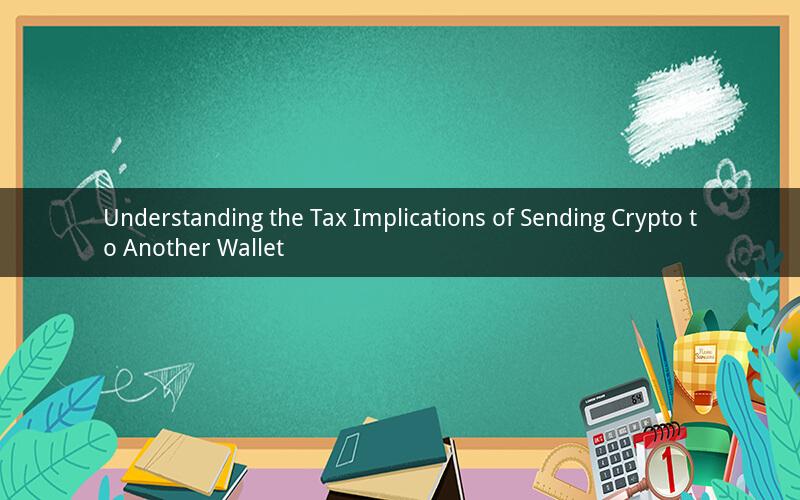
Introduction:
The rise of cryptocurrencies has brought about a new era of digital finance. With the increasing popularity of digital assets, many individuals are now sending crypto to another wallet for various reasons. However, one crucial aspect that often goes overlooked is the tax implications of such transactions. In this article, we will delve into the topic of whether sending crypto to another wallet is taxable and explore the factors that determine the taxability of these transactions.
Is Sending Crypto to Another Wallet Taxable?
1. The Nature of the Transaction:
The taxability of sending crypto to another wallet depends on the nature of the transaction. If the transaction is considered a sale or exchange, it may be subject to taxation. On the other hand, if the transaction is simply transferring ownership of the crypto from one wallet to another, it may not be taxable.
2. Capital Gains Tax:
If the transaction is deemed a sale or exchange, the tax implications will depend on the capital gains tax regulations of the respective jurisdiction. Generally, when you sell or exchange crypto for a higher value than the cost basis, you may be required to pay capital gains tax on the profit.
3. Cost Basis:
The cost basis of the crypto is a crucial factor in determining the taxability of the transaction. The cost basis is the original value of the crypto, which can be calculated in various ways, such as the purchase price or the fair market value at the time of acquisition. It is essential to keep accurate records of the cost basis to determine the tax liability.
4. Taxable Events:
Certain events can trigger taxable transactions when sending crypto to another wallet. These events include selling, exchanging, or transferring crypto for fiat currency, selling or exchanging crypto for another crypto, or receiving crypto as a gift or inheritance.
5. Reporting Requirements:
In many jurisdictions, individuals are required to report their crypto transactions to tax authorities. This reporting is typically done through tax forms, such as Form 8949 in the United States. Failure to comply with reporting requirements can result in penalties and interest.
FAQs:
1. Q: Is sending crypto to another wallet taxable if it is a personal transfer?
A: Generally, sending crypto to another wallet for personal reasons, such as transferring funds between your own wallets, is not taxable. However, if the transaction is considered a sale or exchange, it may be subject to capital gains tax.
2. Q: Can I avoid paying taxes on crypto transactions by using a private wallet?
A: No, using a private wallet does not exempt you from tax obligations. The taxability of crypto transactions depends on the nature of the transaction and the applicable tax regulations, regardless of the wallet used.
3. Q: How do I calculate the capital gains tax on crypto transactions?
A: To calculate the capital gains tax on crypto transactions, you need to determine the cost basis of the crypto, the selling price, and the holding period. The capital gains tax rate will then be applied to the profit, which is the difference between the selling price and the cost basis.
4. Q: Can I deduct expenses related to crypto transactions from my taxes?
A: In some cases, you may be able to deduct expenses related to crypto transactions, such as mining costs or transaction fees. However, the deductibility of these expenses depends on the specific tax regulations of your jurisdiction.
5. Q: What should I do if I am unsure about the tax implications of sending crypto to another wallet?
A: If you are unsure about the tax implications of sending crypto to another wallet, it is advisable to consult a tax professional or financial advisor. They can provide personalized guidance based on your specific situation and the tax regulations of your jurisdiction.
Conclusion:
Sending crypto to another wallet can have tax implications, depending on the nature of the transaction and the applicable tax regulations. Understanding the factors that determine taxability, such as the nature of the transaction, capital gains tax, cost basis, taxable events, and reporting requirements, is crucial for individuals engaging in crypto transactions. It is always recommended to seek professional advice to ensure compliance with tax obligations and avoid potential penalties and interest.